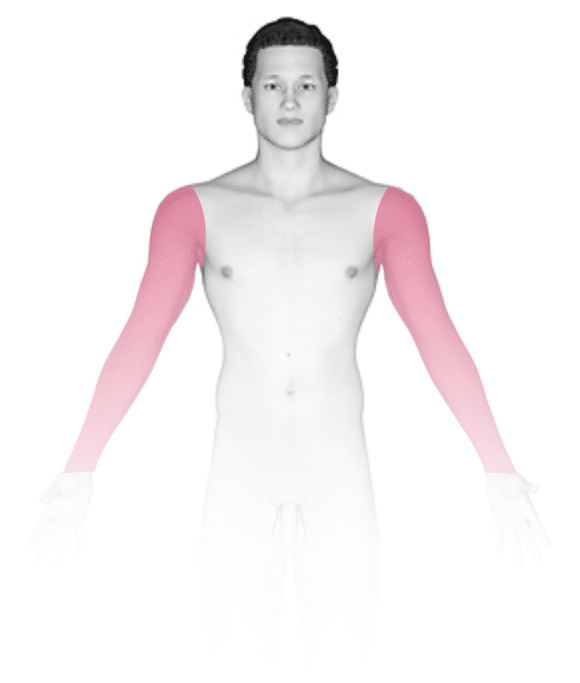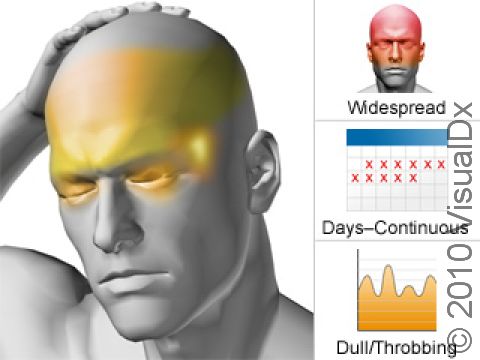Medication Overuse Headache
Medication overuse headache is a chronic headache syndrome with 3 core criteria:
- The use of a medication meant to stop headaches is being taking in too high a dose and too often.
- The majority of days are notable for persistent headache (often, headaches occur daily).
- There is no other medical explanation for the headaches.
The duration of medication overuse required to precipitate headache, length of withdrawal necessary to achieve relief, and relapse rate appear to depend on the specific medication that is being overused. In general, it takes 1–2 years of excessive triptan use (those drugs used in the treatment of migraine and cluster headaches, both discussed separately), 3 years for ergot derivatives (drugs also given for headaches, for those that do not first respond to other drugs), and 5 years for simple analgesics (over-the-counter “anti-inflammatory painkillers” such as aspirin, ibuprofen, acetaminophen, etc) to bring on medication overuse headaches. It also takes longer periods off simple analgesics to achieve relief in comparison to triptan medications. Relapses are more common for analgesic-induced chronic headaches than those facilitated by triptans.
Unfortunately, abruptly stopping the offending medication often elicits severe “rebound headaches,” perpetuating the cycle of medication overuse. Whether or not medication overuse is a cause or result of an otherwise difficult headache disorder in some people is still somewhat controversial.
Immediately seek medical attention if you or someone you are caring for experiences any of the following:
- Stiff neck and a high fever associated with headache
- Sudden onset of a severe headache
- Loss of motor function, the ability to think clearly, or convulsions associated with headache
- Head injury
- Increased intensity and/or frequency of headaches
Who's At Risk?
A person with chronic medication overuse headaches generally have some type of pre-existing headache syndrome (eg, tension headaches, migraines) that is made worse by the repetitive and excessive use of a variety of possible medications. Even people with well-controlled headache disorders (again, tension headaches, migraines, etc) who take pain medications for other reasons – rheumatoid arthritis, for example – tend to develop medication overuse headache. As common headache syndromes are more often seen in women, medication overuse headache, therefore, is also more commonly seen in women.
Signs & Symptoms
In medication overuse headaches, there is usually a dull, moderately intense, pressure-type feeling on both sides of the head with superimposed migraine attacks of classic symptoms (nausea, light and sound sensitivity, etc).
Self-Care Guidelines
Treatment of medication overuse headache requires the supervision of your physician (see below). However, there are many self-care strategies that can be used coupled with treatment from your doctor.
- Elimination of caffeine and undertaking a careful assessment of diet and how it may be helping to worsen your headache, including keeping a headache diary and comparing the foods you have eaten with the days you have had a headache.
- Conversation and support from others with medication overuse headache, such as online forums like the NeuroTalk or BrainTalk Communities. There are also groups and meetings organized by the American Headache Society.
- Yoga, exercise, massage therapy, and other relaxation techniques.
Treatments
Medication overuse headaches may take weeks to months to treat. A combination of medicine and behavioral changes are usually necessary to effectively reduce medication overuse headaches. The most important measure in treatment of this headache syndrome is stopping the overused medications under a physician’s care. Another important thing to note is that headaches often get worse before they get better.
With the elimination of the offending medication and the associated worsening of headaches, other medications may be used to “bridge” the interval between stopping medications and successful relief. This will almost always be done outside of the hospital, provided people are motivated to take an active role in their treatment and have proper support to help with difficult periods. Several possible strategies are as follows:
- The overused medications can be tapered to progressively lower doses while a preventative long-term agent is added.
- The overused medication can be abruptly stopped with the simultaneous use and eventual tapering of a short-term transitional drug to break the headache cycle.
- The overused medication can be abruptly stopped, a preventative agent started, and a third transitional agent used to ease the change from the overused drug to a more benign one.
Certain medications, such as pain relievers like aspirin and classes of medications called ergots and triptans, can be stopped quickly. Others, however, such as opiates (oxycodone, etc), barbiturates, and benzodiazepines, are withdrawn over weeks to avoid serious withdrawal effects.
Transitional medications include steroids or long-acting triptans in patients not using them.
Preventative medications can include agents that are often used for other chronic daily headaches such as beta-blockers (propranolol), calcium channel blockers (verapamil), topiramate, valproic acid, or tricyclic antidepressants (amitriptyline).
Some patients cannot be easily taken off overused medications without requiring more powerful transitional agents, frequent rescue medications, or rapid adjustments to transitional and preventative dosages. In these cases, hospital admission for intravenous dihydroergotamine, valproate, diphenhydramine, magnesium, or ketorolac can be useful, in addition to close observation.
Visit Urgency
People with medication overuse headache often come to neurologists or headache specialty clinics because their headaches are more frequent and begin to interfere with their daily activities.
You should call your doctor for any headache if:
- You develop new symptoms not typical of prior headaches.
- An unusually severe headache occurs.
- You pass out or lose time.
- Your headache lasts an unusually long time.
- Headache awakens you from sleep.
- Fever and neck pain or stiffness are present.
In the case of a medication overuse headache, you should call your doctor if:
- You develop a new problem associated with a medication given to treat the headache, especially rash.
- You have side effects of the medication that interfere with your daily life.
- You develop a new medical condition separate from your headache problem.
Last modified on October 6th, 2022 at 3:05 pm

Not sure what to look for?
Try our new Rash and Skin Condition Finder
